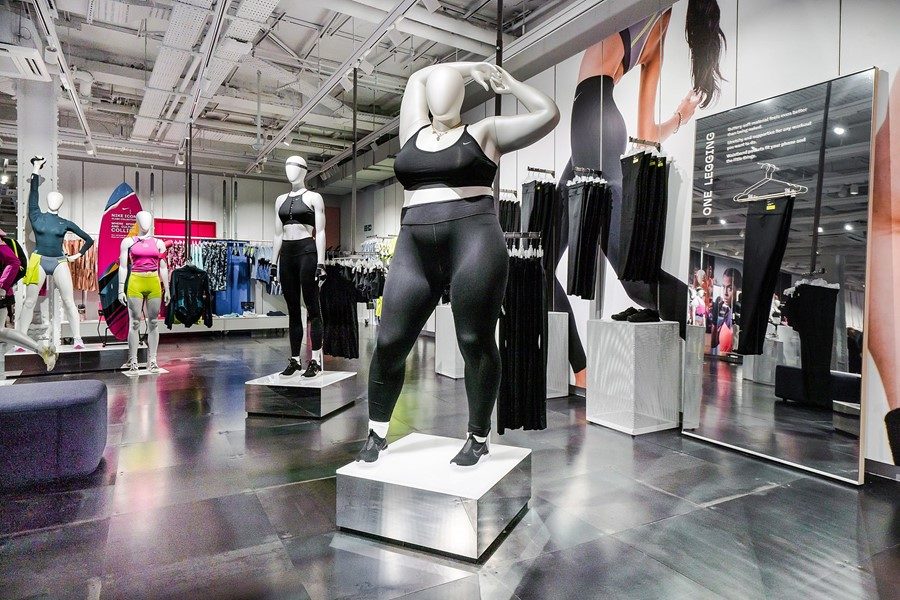When Tanya Gold, restaurant critic of The Spectator’s London mothership, criticized Nike for promoting unhealthy body images by using ‘fattequins’ — oversized mannequins — she received an extra serving of inbox hate for being ‘fatphobic’, and a side order of online death threats with extra malice. And all for speaking the truth about encouraging women to maintain a dangerous weight and buy into unhealthy beauty standards.
‘Go fuck yourself, Tanya Gold,’ tweeted powerlifter and Mixed Martial Arts fighter Tony Posnanski.
Gold received massive blowback from progressive outlets, celebrity activists, and a critical mass of Twitter civilians. Jameela Jamil, Amy Schumer, Iskra Lawrence, Refinery29, People, HuffPost and Glamour all denounced Gold and the Telegraph for her honest concern that Nike was promoting an unhealthy beauty standard. They accused her of fat-shaming, even when sharing her experience of fighting her own weight war.
‘What Tanya didn’t account for are the numerous women out in the world who look like the mannequins in question and who do, in fact, run in their shiny Nike gear,’ fashion writer Mekita Rivas wrote at Refinery29. ‘They also ride bikes, lift weights, practice yoga — the same physical activities everyone does.’
But lots of people don’t do those things. The average American falls short of the recommended 10,000 steps a day, never mind partaking in all this inspirational exercise. Gold wasn’t speaking about women who are healthy in their bodies, whatever their proportions, but the many who aren’t. She should know. Like so many women, she’s struggled with her weight for much of her life.
Gold’s article wasn’t a takedown of fat women. She simply pointed out the very real, medically documented health risks in being drastically overweight. The Nike mannequin, Gold wrote, is not simply plus-size, and within the spectrum of sizes that are carried in most mainstream shops. It is also a sculptural representation of a woman who is risking early mortality.
It’s often hard for women to tell what the right weight is. Doctors caution women about their weight near incessantly; no annual check-up is complete without a warning to eat right and lose a few. But the fact is that there is an obesity epidemic in the United States and across Europe. The fat lobby is justifiably concerned with the incessant body-shaming of women, but denying obesity as a problem doesn’t do anything to help women either.
Engaging in risky behavior — unhealthy relationships with food, overindulgence in alcohol or drugs, crazy exercise regimens — is a personal choice. But denying the potential negative consequences helps no one. The risks of obesity include Type 2 diabetes, high blood pressure, heart disease and strokes, sleep apnea, fatty liver disease, kidney disease, pregnancy problems, and increased chances of certain cancers. Even Nike’s stretchy Lycra gear can’t protect against all that.
Fashion brands have always promoted beauty standards that women struggle to live up to. From runway models and Balanchine dancers to airbrushed celebrities and depilated porn stars, an industry of images expects women to conform to ever-shifting beauty standards, and exploits their insecurities to sell a perfect image back to them. Women diet and exercise. They undergo drastic surgeries, and wire their jaws shut. They cleanse and detox, hoping to achieve standards of physical excellence that only exist among elite athletes or in the fantasies of a Madison Avenue conference room.
Now the standards have flipped, because so many consumers have over consumed, and feel justified in both indulging those desires and not altering their habits. Instead of being told to celebrate anorexic thinness, we’re now told to celebrate gluttonous fatness — and accused of self-loathing or betraying our sex if we object to the commercial hustle. By all means, let Nike sell larger sizes than just the 0’s and 2’s on the racks. It’s frustrating when you need a pair of running shorts that’ll cover your oversized American hips without cutting off circulation to your oversized thighs, and you can’t find anything even remotely proportioned. But is Nike really celebrating the same bodies that Michelle Obama was trying to help with her campaigns for healthy food and against obesity? Or is this just virtue signaling, with the goal of commercially exploiting a new, and no less unhealthy, image of the female body?
The thing is, we’ll buy it. Women have always bought it. We buy into unrealistic beauty standards, unrealistic emotional standards, unrealistic work standards and unrealistic motherhood standards. We are desperate to be more than okay — to be successful on all fronts, to do it backwards and in high heels, and with a smile. It’s no stretch to persuade us of the intersectionality of the body and the beauty business, to believe that beauty is a super-skinny girl with doe eyes and big breasts, and that we should believe that our fatness is also beautiful. We hate ourselves for not being the former, and we hate ourselves for not believing the latter.
Nike is just one of the corporations that are gaslighting American, and now European, women, for their bottom line. The more big and stretchy pants they sell us, the more we won’t notice that our waist lines are expanding, and the more stretchy pants we will buy in the hope that they’ll make us look thinner. The professionally perfect and perpetually hungry – the skinny actresses, models, and celebrities — can keep telling us that we should accept ourselves just as we are, that we don’t need to take responsibility for our own lives and desires, that we should believe their woke advocacy over doctors, Michele Obama, and the small, still voice that tells us that maybe we should put down that fried pizza milkshake.
It is a fact that we are mostly fat. The scales that take our weight bear it out. In 2015, a Centers for Disease Control and Prevention report that the average American woman now weighs 166.2 pounds – almost exactly the same as the average American man weighed in 1960, and over 20 pounds more than the average female weight in 1960, 140 pounds. Our chubby hubbies aren’t doing much better. Between 1960 and 2015, the average American male has packed on an extra 30 pounds, from 166.3 to 195.5 pounds. If we were healthy, and this was working for us, then why is there so much effort to slim down the populace?
We can do mental gymnastics to get to a place where we’re chill with being overweight, because we can justify anything. But should we? And why should we celebrate unhealthy body types of any proportion? We consume more calories than we need, and we choose a diet much heavier in calories than the ones eaten by our more active forebears. Our food is dripping with excess calories. There are national chains selling ‘healthy’ salads that are more fattening that cheeseburgers.
When corporations tell us to accept and cherish our fatness, and also to buy the products that will cure it, they are like the proverbial Oz. We’re pigging out on melted cheese, corn syrup and palm oil, and tormented by the possibility of becoming a different person by buying into the diet and exercise cults. Meanwhile behind the curtain, they’re preparing to force-feed us not only fatally fattening food, but also the empty calories of a value system that tells us not to worry about it.
Gold wasn’t speaking out of hatred, or to contradict the identity politics dogma that ‘representation matters’, even when what it represents is unhealthy. She was simply asking women to consider the source of what is being represented, and why. When Nike and its kind supersize the message that unhealthy beauty standards, whether too big or too small, are to be celebrated, it isn’t because they love us as we are or want to represent us. It’s because they want to buy and sell us, to keep us fat and unhappy so we keep buying more. It’s up to us to not feed at the teat of corporate propaganda.


















